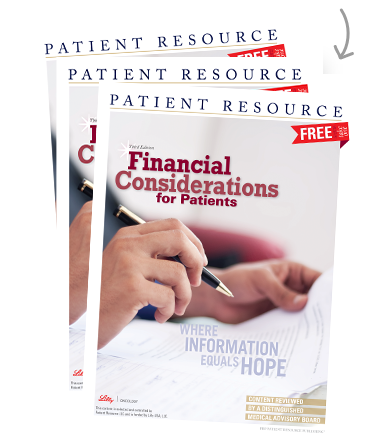Financial Considerations
Gain Peace of Mind Through Estate Planning
While estate planning is a task many people prefer to avoid, experts recommend that you take care of it early in life. Although it’s often emotionally difficult, estate planning has benefits that bring peace of mind and a sense of security. For example, it:
- Documents your wishes regarding the distribution of your assets
- Ensures you receive the level of medical care you want
- Reduces the burden of difficult decisions and tasks on loved ones

What is estate planning?
Estate planning is preparing and documenting a plan of how to dispose of your property before or after death. It usually involves completing advance directives, naming a power of attorney, developing a will and possibly establishing trusts. Regardless of how much money you have, your health or your age, you should have a plan that states how to transfer your assets to the people you choose. If you don’t write down your wishes, they can be challenged and perhaps never carried out as you want.
The first step in estate planning is to gather paperwork related to your assets (see sidebar). In general, assets include bank accounts, real estate, investments (stocks and bonds) and an inventory of personal possessions. Next, you will choose people you trust to carry out your decisions when you are no longer able. You will also determine who inherits the assets in which you have not already named beneficiaries; most likely, you have already named beneficiaries in life insurance policies, retirement plans and annuities.
Documents Needed to Prepare for Estate Planning
- Life and health insurance policies
- Bank account statements
- Real estate documents
- Stocks and/or bonds
- Retirement accounts
- Deeds of trust
- Internet user names and passwords
- Contact information for banks, insurance agents, etc.
- Inventory of assets, including valuables and personal items of note
Advance directives
An advance directive is a set of written instructions that states what specific actions should be taken when a person’s health prevents him or her from making decisions due to illness or incapacity. Also known as a “living will,” the advance directive tells your doctor what types of life-sustaining treatment you want and helps ensure you receive the level of care you wish. The primary reason for advance directives is to ensure your wishes regarding your health care choices – including the types of medical procedures you want administered or withheld as well as end-of-life decisions – are carried out.
It’s also wise to select a health care proxy. This person is someone you trust to make medical decisions on your behalf if you become unable to do so yourself. When you decide who should have this responsibility, be sure to explain what you’re asking of your proxy, why you picked him or her and confirm their willingness to act under this authority. Being a health care proxy is a great responsibility, so be sure to talk to the person you choose, and concisely convey your wishes. Your health care proxy needs to know about your end-of-life wishes, including what medical treatments you would want and whether or not you have an advance directive in place. Talking to your proxy means discussing values and quality-of-life issues as well as treatments and medical situations. Because you cannot anticipate every situation that could occur, your proxy may need to base a decision on what he or she knows about your values and your views of what makes life worth living. These are not simple questions, and your views may change. For this reason, talk to your proxy in depth and over time. This knowledge will make it easier for your proxy to make decisions if necessary.
It’s important to note that advance directive documents only give general direction related to future care based on unknown and hypothetical specifics. Because you cannot predict when this may become applicable, designating a proxy allows someone you choose to make daily decisions based on current medical advice, treatment options and the specifics of the injury, illness or acute care that is needed.
Questions to Help Guide Your Decisions
- Life and health insurance policies
- What kinds of life-sustaining treatment do I want?
- If I am unable to make my own health care decisions, whom do I trust to make the decisions for me?
- Whom do I want to handle my financial affairs if I am unable to do so myself?
- Whom do I want to inherit my assets? Are there specific instructions that I want followed?
- Do I want specific personal possessions to be passed on to certain loved ones?
- Are there any religious or spiritual beliefs that would dictate specific medical or funeral treatment?
Power of attorney
A power of attorney is a document that grants someone the authority to handle your financial, legal and (in some cases) health affairs if you are unable to do so yourself for any period of time. This is done in writing in front of a witness and notary. Your document should clarify the length of time and conditions in which this power is valid. Be sure to select a person you trust to make decisions on your behalf.
Wills and trusts
Creating a will allows you to state how you would like to distribute your assets and can also help avoid delays in carrying out your wishes. As part of drawing up your will, you will choose an executor, who will be responsible for using your assets to pay all of your final debts and expenses. You will also detail how you would like your remaining assets to be distributed by stating who your beneficiaries will be (spouse, family, friends and charities), what they will receive, and how and when they will receive their inheritance.
In addition, you can choose to leave assets to your beneficiaries outright or in the form of a trust. With a trust, you can specify the conditions under which your designated beneficiary receives an asset. For example, you may want to specify an age at which a minor child receives an asset. There are many types of trusts, so it’s a good idea to work with an attorney experienced in estate planning to help you decide which is best for you. Because estate laws vary according to state, make sure the attorney you choose is familiar with the laws in your particular state.
Your will allows you to direct other decisions as well. For example, you can name a guardian for minor children and specify funeral arrangements. Planning your funeral preferences in advance will save your loved ones unnecessary expense and anxiety at a difficult time in their lives.
If you already have a will, check to make sure it’s up-to-date and your heirs are named as you wish. If you need to make changes, write them down and bring the list to your attorney. Keep in mind that many of the documents you have prepared for use during your lifetime (such as a standard power of attorney or medical proxy designation) will automatically expire at the time of your death. Your will is the primary document of record that guides matters following your death.
Reasons for Up-to-Date Estate Documents
- Provide instructions for your medical care in times when you may be critically disabled, incapacitated or in need of hospice care.
- Minimize taxes, court costs, unnecessary legal fees and time delays processing your wishes following your death.
- Allow you to designate a guardian and an inheritance manager for minor children.
- Give you the opportunity to provide for family members or spouses, including those with special needs, without disrupting government benefits.
- Provide for the transfer of your business at your retirement, disability or death.
- Provide an opportunity to learn and make decisions about possible protections for your estate, including life insurance, disability income insurance, long-term care insurance, etc.
- Offer an opportunity to communicate your values (religious, social, civic responsibility, etc.) to those who will play an important role in making decisions on your behalf. This may give insight into how to proceed with decisions for which you’ve not provided specific direction.



